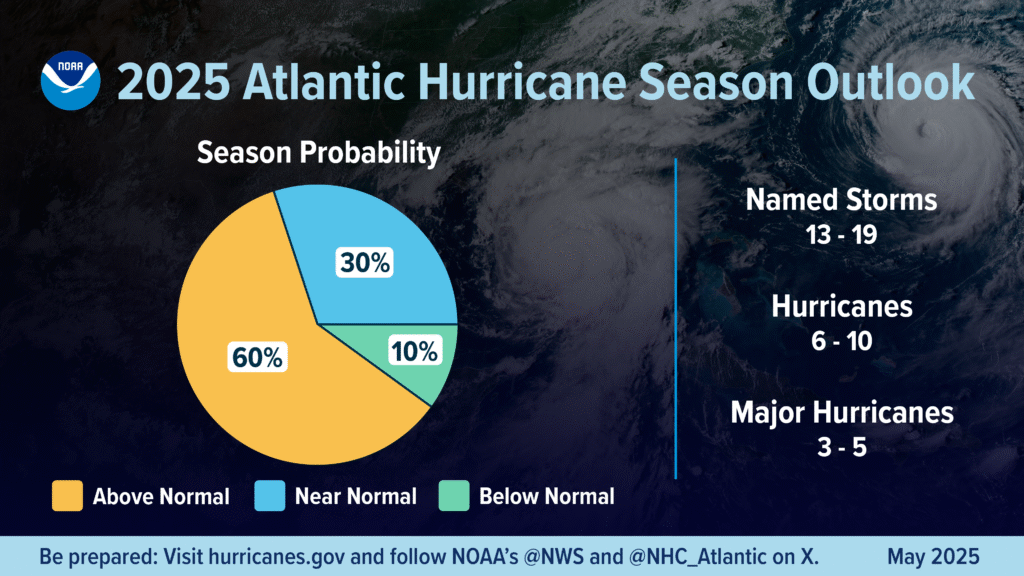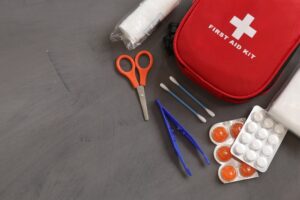[aioseo_breadcrumbs]Hurricane season started on Tuesday, June 1st, 2021. NOAA’s Climate Prediction Center is forecasting another above-normal Atlantic hurricane season. For 2025, a likely range of 13 to 19 named storms, of which 6 to 10 could become hurricanes, including 3 to 5 major hurricanes (category 3, 4, or 5) is expected.

According to the National Weather Service, hurricane preparedness starts now, when you have the time and are not under pressure from an approaching storm. This is also applicable to your animals (small and large). Your pets are an important member of your family, so they need to be included in your family’s emergency plan.
For all your animals, there are three basic points to consider:
- Prepare a disaster plan.
- Build an emergency kit.
- Stay informed.
Here, we will cover only these points to prepare your companion animals/pets for an emergency. However, keep in mind that many of these steps are also applicable in any emergency.
- Develop an evacuation plan for all your animals and practice the plan. If local officials ask you to evacuate, that means your pet should evacuate too.
-
- Identify alternate sources of food and water b. Keep vehicles well-maintained and full of gas.
- Keep emergency cash on hand.
- Keep identification on your pets, including rabies and license tags. Identification should provide your name, home address, and/or phone number(s), i.e., collar tags, microchips, tattoos.
- Make photocopies of important veterinary documents and proof of ownership.
- Assemble an animal evacuation kit.
- Prepare your emergency contact list now, before disaster strikes. Include addresses and 24-hour contact numbers, if available.
-
- Just as you do with your family’s emergency supply kit, think first about the basics for survival, such as food and water. Have two kits, one larger kit if you are sheltering in place and one lightweight version if you need to evacuate. Assemble the kit in easy-to-carry, waterproof containers. Store it in an easily accessible location away from areas with temperature extremes. Replace the food, water, and medications as often as needed. Consider the following to include in your kit:

-
- Two-week supply of food (dry & canned). Spoon (for canned food)
- Two-week supply of water in plastic gallon jugs with secure lids
- Batteries (flashlight, radio)
- Cage/carrier (one for each animal, labeled with your contact information)
- Can opener (manual)
- Copies of veterinary records and proof of ownership
- Emergency contact list
- Familiar items to make pets feel comfortable (favorite toys, treats, blankets)
- Flashlight
- Diet: record the diet for each animal, including what not to feed in case of allergies.
- Medications: list each animal separately, and for each medication, include the drug name, dose, and frequency. Provide veterinary and pharmacy contact information for refills.
- Leash and collar or harness (for each animal)
- Litter, litter pan, litter scoop
- Maps of the local area and alternate evacuation routes
- Muzzles (dog or cat)
- Newspaper (bedding, litter)
- No-spill food and water dishes
- Paper towels
- Radio (solar and battery-operated)
- Stakes and tie-outs
- Trash bags
- Pet shampoo
-
- A first-aid kit for your pets is also important to prepare. Talk to your veterinarian about what is most appropriate for your pet’s emergency medical needs. The list below is not comprehensive and serves as an example.

-
-
-
- Anti-diarrheal liquid or tablets
- Antibiotic ointment (for wounds)
- Bandages, bandage tape
- Disinfectant
- Cotton bandage rolls
- Cotton-tipped swabs
- Elastic bandage rolls
- Flea and tick prevention and treatment
- Gauze
- Alcohol
- Saline or mild wound and body cleanser
- Medications and preventatives (such as heartworm prevention)
- Non-adherent bandage pads
- Styptic powder (clotting agent)
- Syringe or eyedropper
- Thermometer
- Towel and washcloth
-
-
- Stay informed and be prepared for changing conditions. Plan with neighbors, friends, or relatives to make sure that someone is available to care for or evacuate your pets if you are unable to do so.
Lastly, keep in mind that the Atlantic hurricane season extends from June 1 through November 30.
For more information:
https://www.noaa.gov/media-release/noaa-predicts-another-active-atlantic-hurricane-season
https://www.ready.gov/hurricanes#
https://ors.od.nih.gov/ser/dem/emergencyPrep/Pages/Caring%20for%20Animals.aspx

